The phrase “AI isn’t the future of marketing anymore; it’s the present” has become cliche, right?
But you know why things become cliche?
Because they are true and continue to be true many times over.
From content generation to predictive analytics and personalization, AI is now deeply integrated into daily marketing workflows. Brands that aren’t using it are already falling behind. The competition becomes faster and more efficient. How? They’re letting AI do the heavy lifting.
Here’s a breakdown of the most relevant AI marketing statistics and what they actually mean for marketers on the ground.
Boost your lead generation and marketing efforts with Lyro AI
AI marketing statistics: overview
AI is changing how marketers work, from automating repetitive tasks (via chatbot automation, for example) to improving campaign performance at scale. Contrary to popular belief, or should we say fear, AI in marketing will only enhance jobs, it won’t steal them—and that’s coming from AI and marketing professionals themselves.
Here’s a quick infographic overview of AI in marketing statistics:
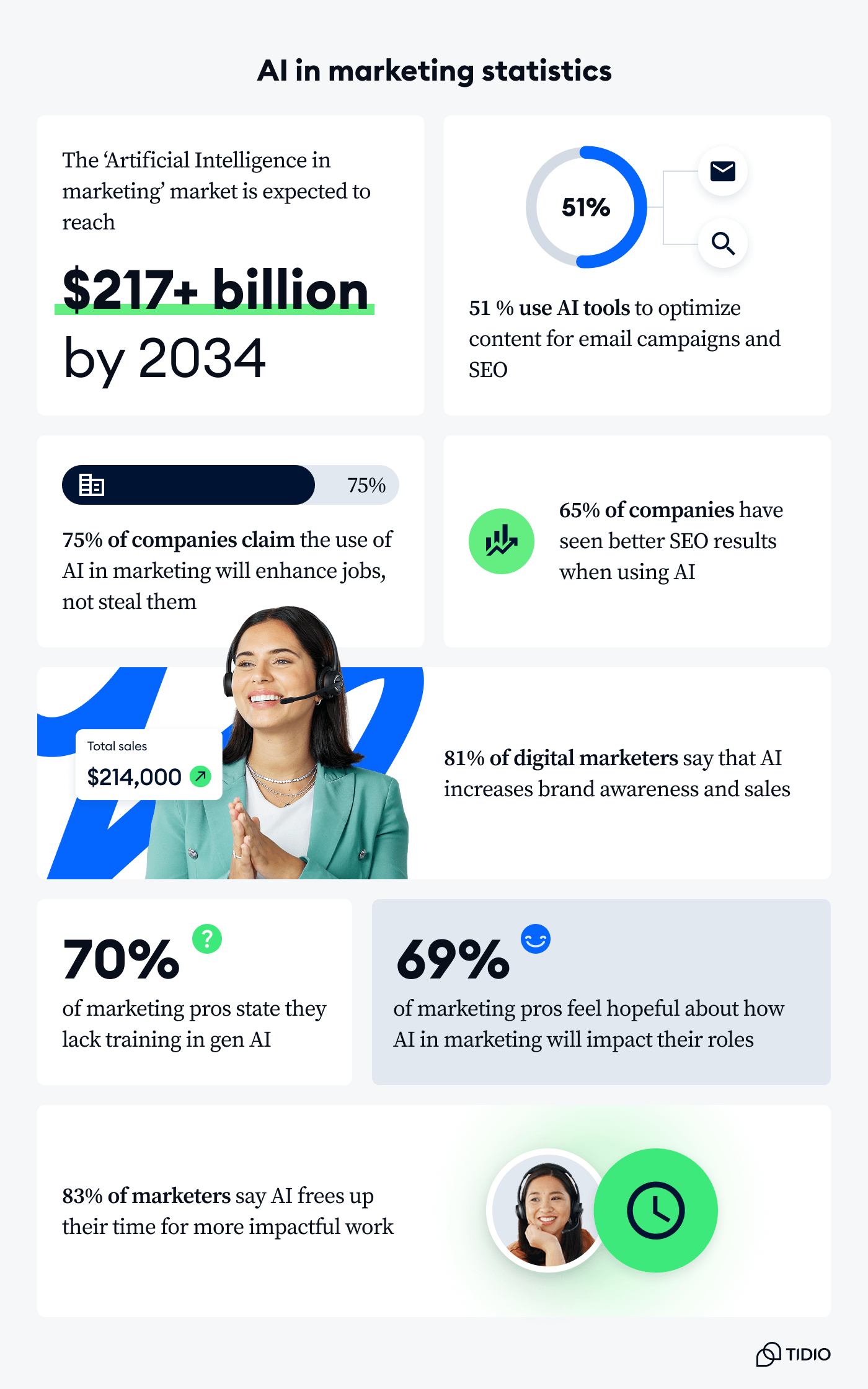
The list of benefits of AI in marketing is huge and is a topic for another article. For now, let’s take a more detailed look at the raw data that matters.
1. The ‘AI in marketing’ market is expected to reach $217+ billion by 2034
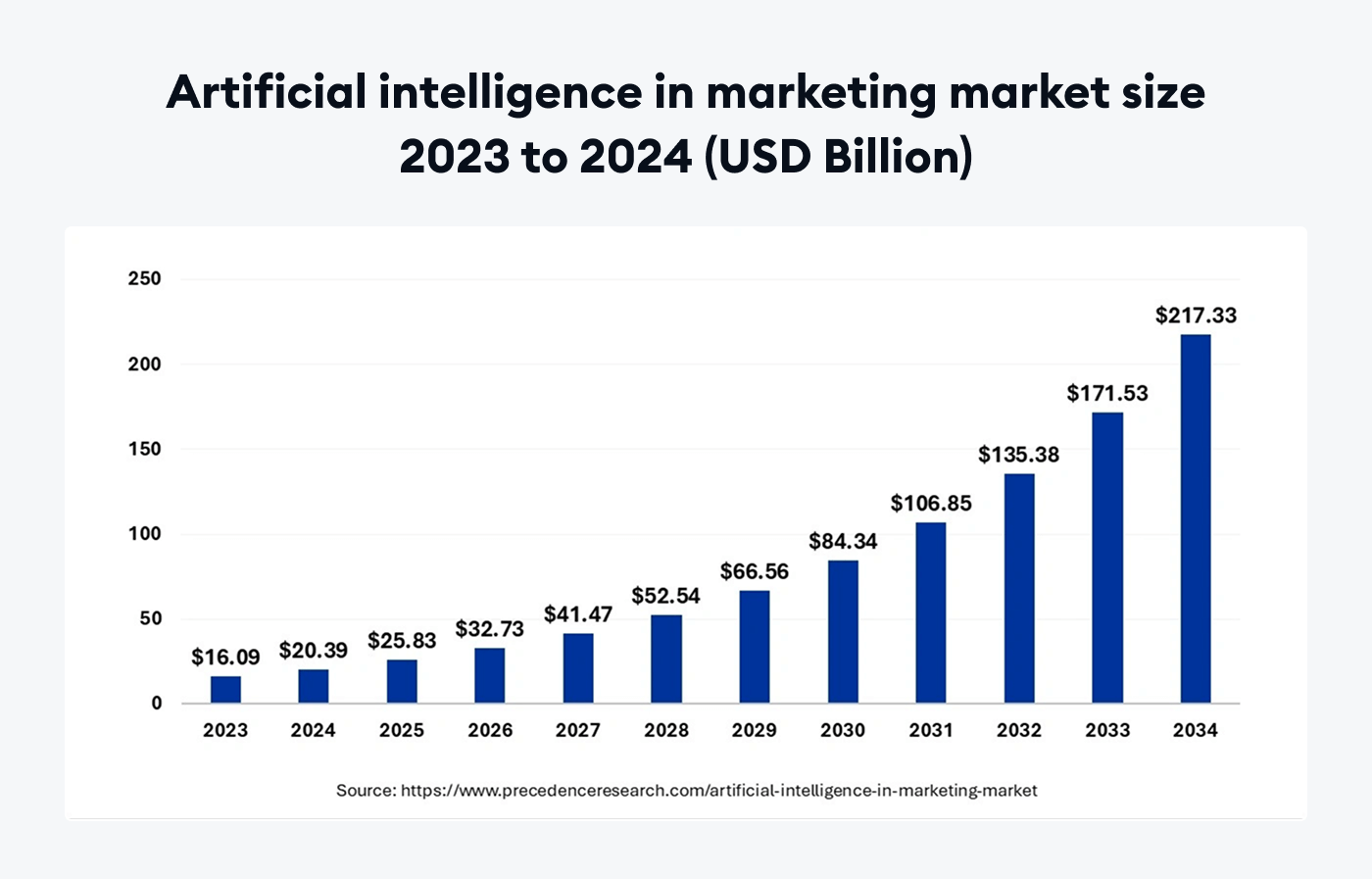
The application of artificial intelligence in marketing is on the rise. The AI in marketing market is expected to grow at a CAGR of 26.7% by 2034, with its market size expected to reach a value of $217.33 billion. [1]
The AI marketing sector is currently worth $47.32 billion in 2025, up from $12.05 billion in 2020. This is even more than expected, so this checks out, and it is safe to say that the projected 2034 figure will likely be higher than this.
This isn’t just hype. It’s proof that organizations are treating AI as a core growth engine, not just a shiny new tool. The investment is scaling with the results.
From predictive customer insights for better customer service strategies to programmatic ad buying, AI adoption is becoming standard. And as tech improves, so does ROI.
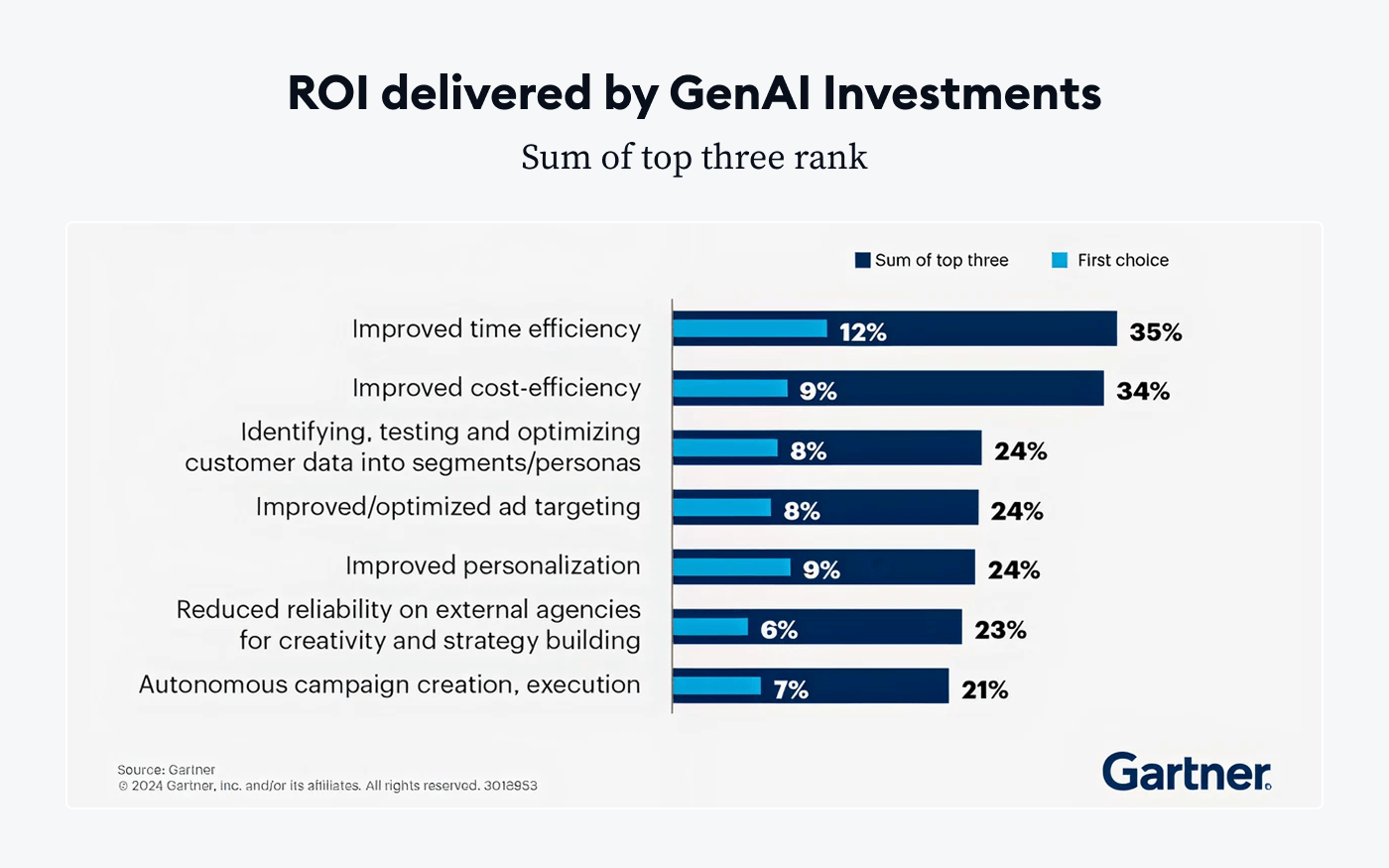
Read more: Learn how to use AI for customer success automations.
2. Almost 90% of digital marketers use AI in their day-to-day tasks
As much as 88% of marketers already use AI or marketing automation tools regularly. This includes tasks like audience segmentation, content creation, A/B testing, and AI chatbot integration for automated interactions. [3]
Most don’t even realize how embedded it is—Google Ads uses machine learning by default. So do SEO tools like Clearscope and Surfer. And platforms like HubSpot now integrate generative AI across content workflows, and let’s not forget numerous companies that use Lyro conversational AI agent to automate customer services and even boost revenue.
If you’re not using AI daily, you’re behind.
Read more: Find out which marketing automation software is best for your business.
3. Over 50% of marketers use AI tools to optimize content for email campaigns and SEO
More than half of marketers are using AI to improve email marketing analytics and performance, as well as SEO rankings. [2]
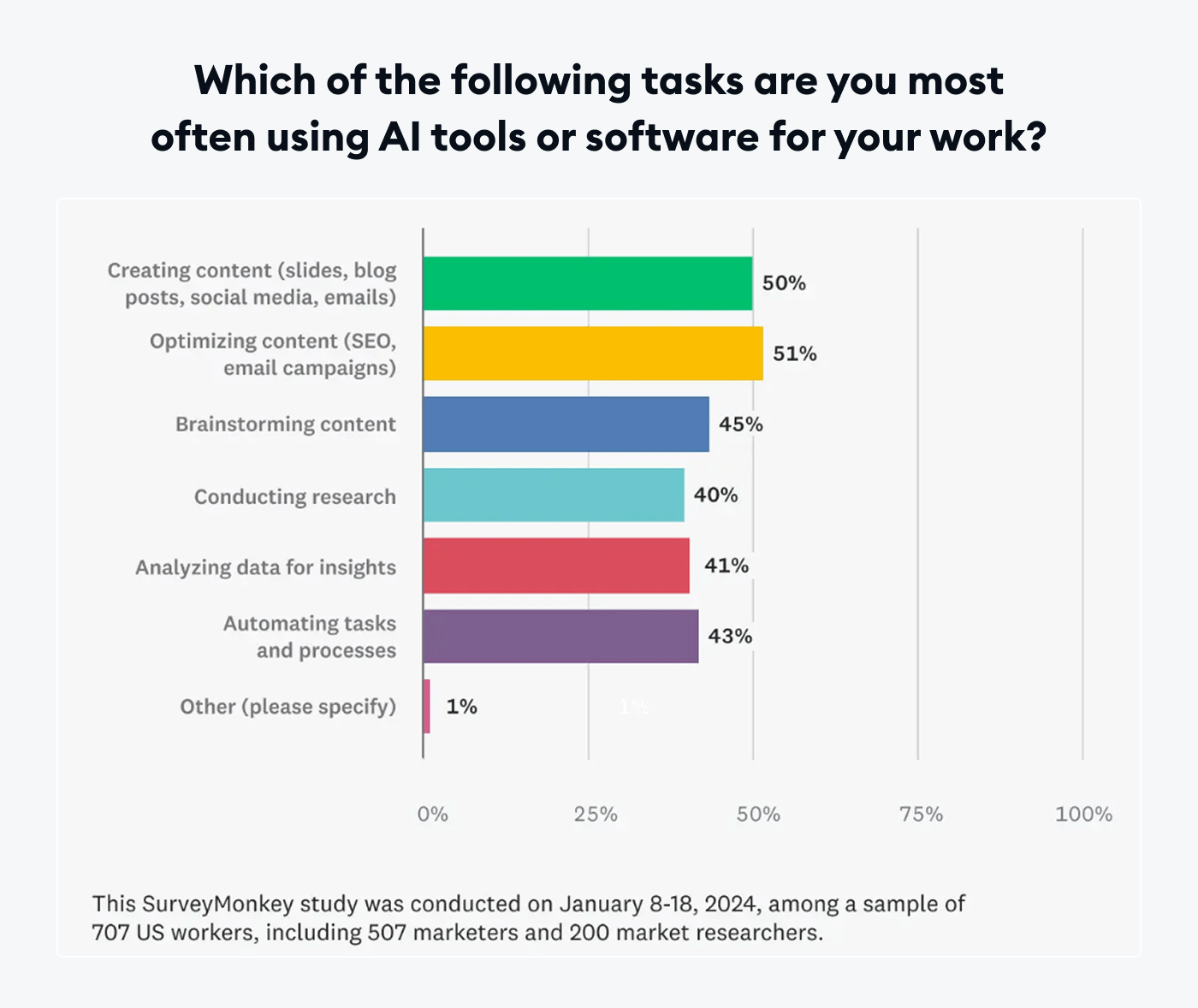
AI tools can test subject lines and personalize messaging, for example. For SEO, they help with keyword clustering, content scoring, and semantic optimization.
This leads to better open rates, higher CTRs, and faster ranking content.
Read more: Learn critical email marketing statistics and get insight into how to improve your leads.
4. Three-quarters (75%) of companies claim the use of AI in marketing will enhance jobs, not steal them
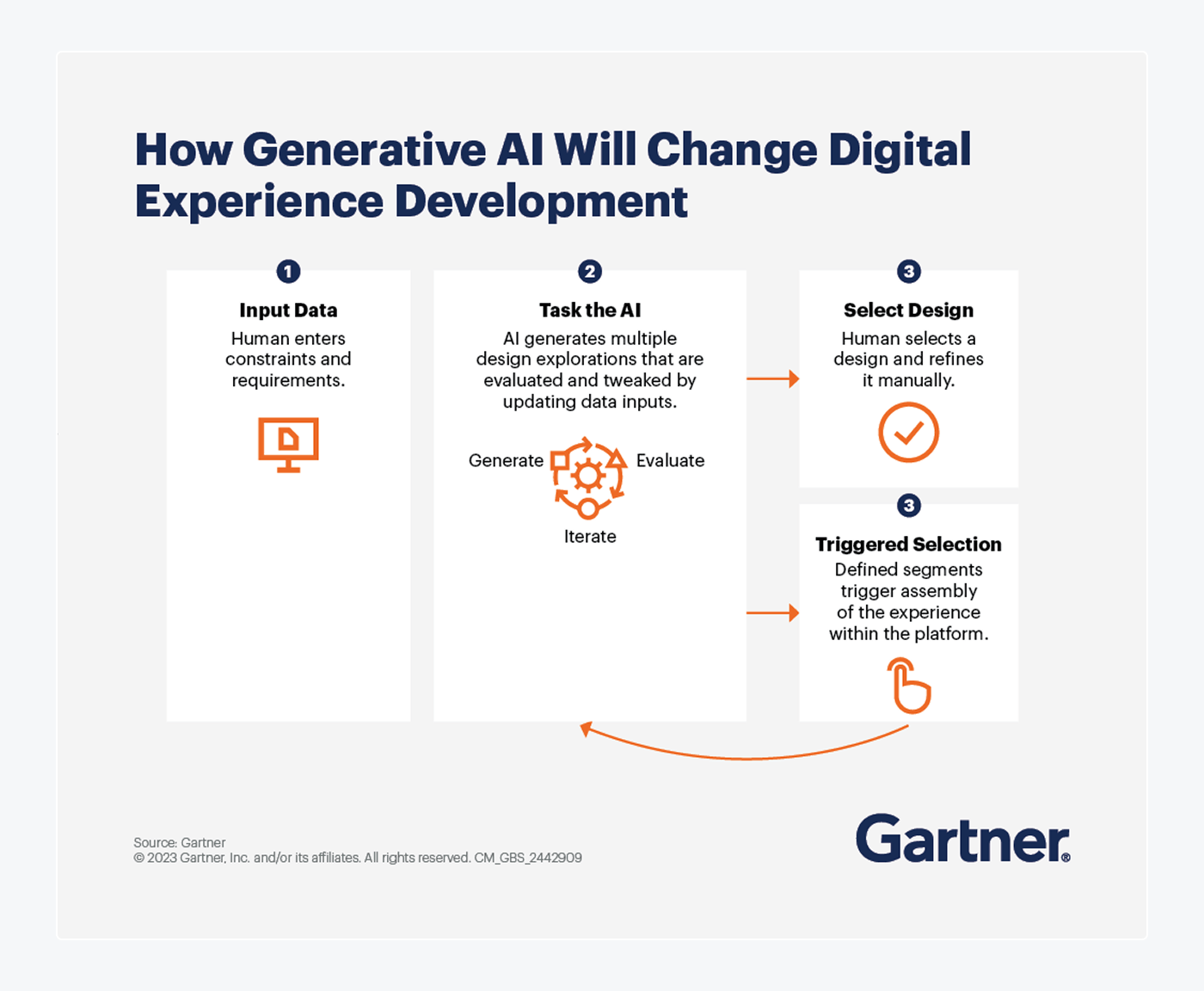
Contrary to the panic, AI is seen as an assistant, not a replacement.
As many as 75% of businesses believe AI will enhance roles by handling repetitive tasks—freeing marketers to focus on strategy, creativity, and experimentation. [8]
This is already happening. AI writes first drafts, humans refine. AI analyzes performance, humans define objectives.
The teams getting the best results use AI to do more, not to do less.
Read more: Learn the difference between chatbots and AI virtual assistants.
Implement Lyro AI agent to boost your customer experience and lead generation
5. Better SEO results when using AI have been reported by 65% of companies
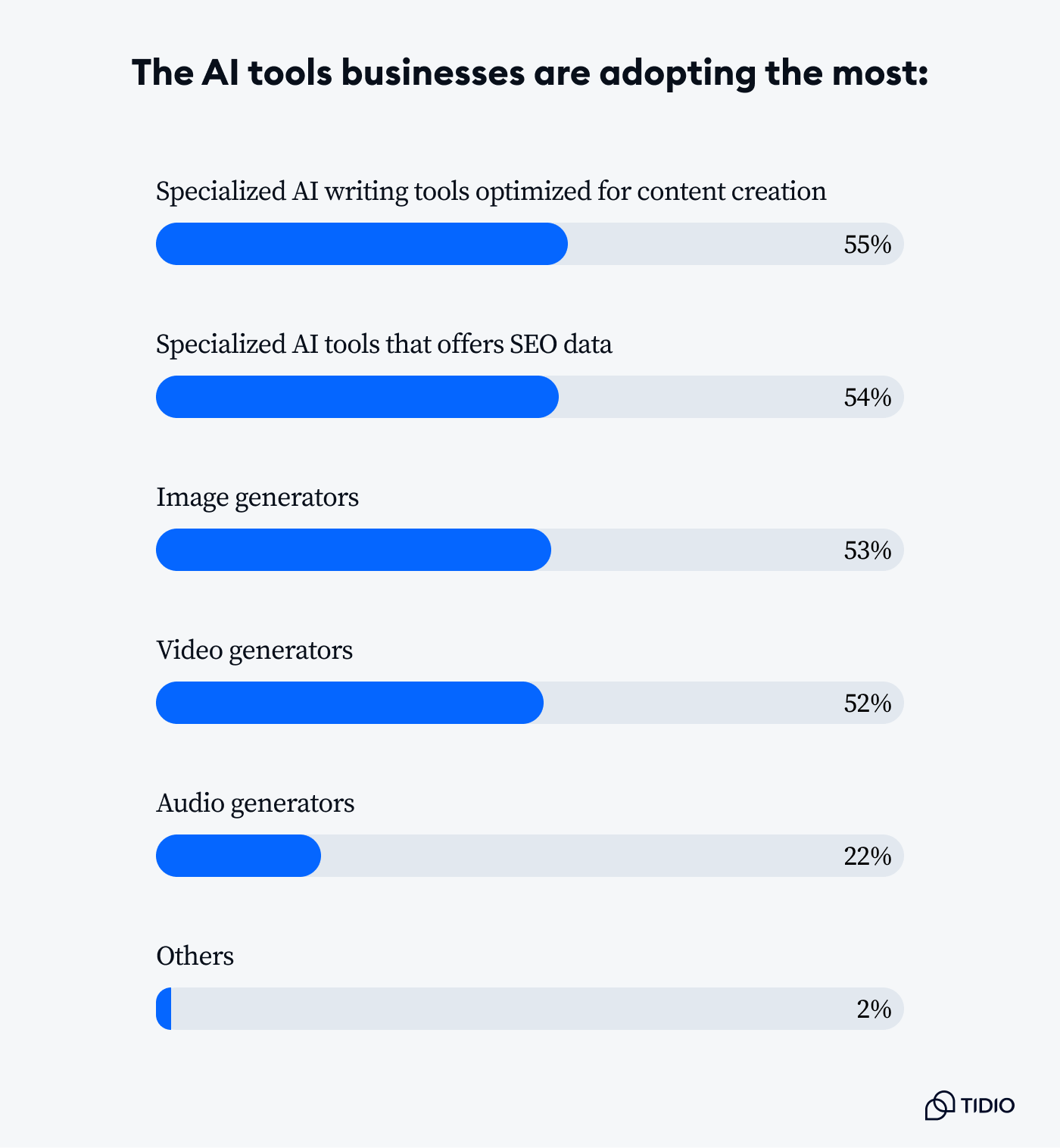
65% of businesses reported improved SEO performance after implementing AI tools. [6]
Why it works: AI reduces guesswork. It analyzes what top-ranking pages have in common and replicates those patterns, faster than human teams ever could.
Here are additional stats from the Semrush study:
- 67% also see an improvement in content quality when using AI
- 68% get a higher content marketing ROI due to AI
- 37% of companies that don’t use AI don’t understand how it works
- 93% review their AI-generated content before publishing it
- The majority of consumers tend to prefer AI-generated copy
Instead of chasing Google’s algorithm, marketers can let AI do the pattern recognition. Then they can use that data to produce optimized content at scale.
For example, Jasper AI’s SEO mode or Surfer’s Content Editor helps teams optimize blog posts in real-time, shaving hours off the editorial process.
6. Over 80% of pros using AI in marketing say that AI increases brand awareness and sales
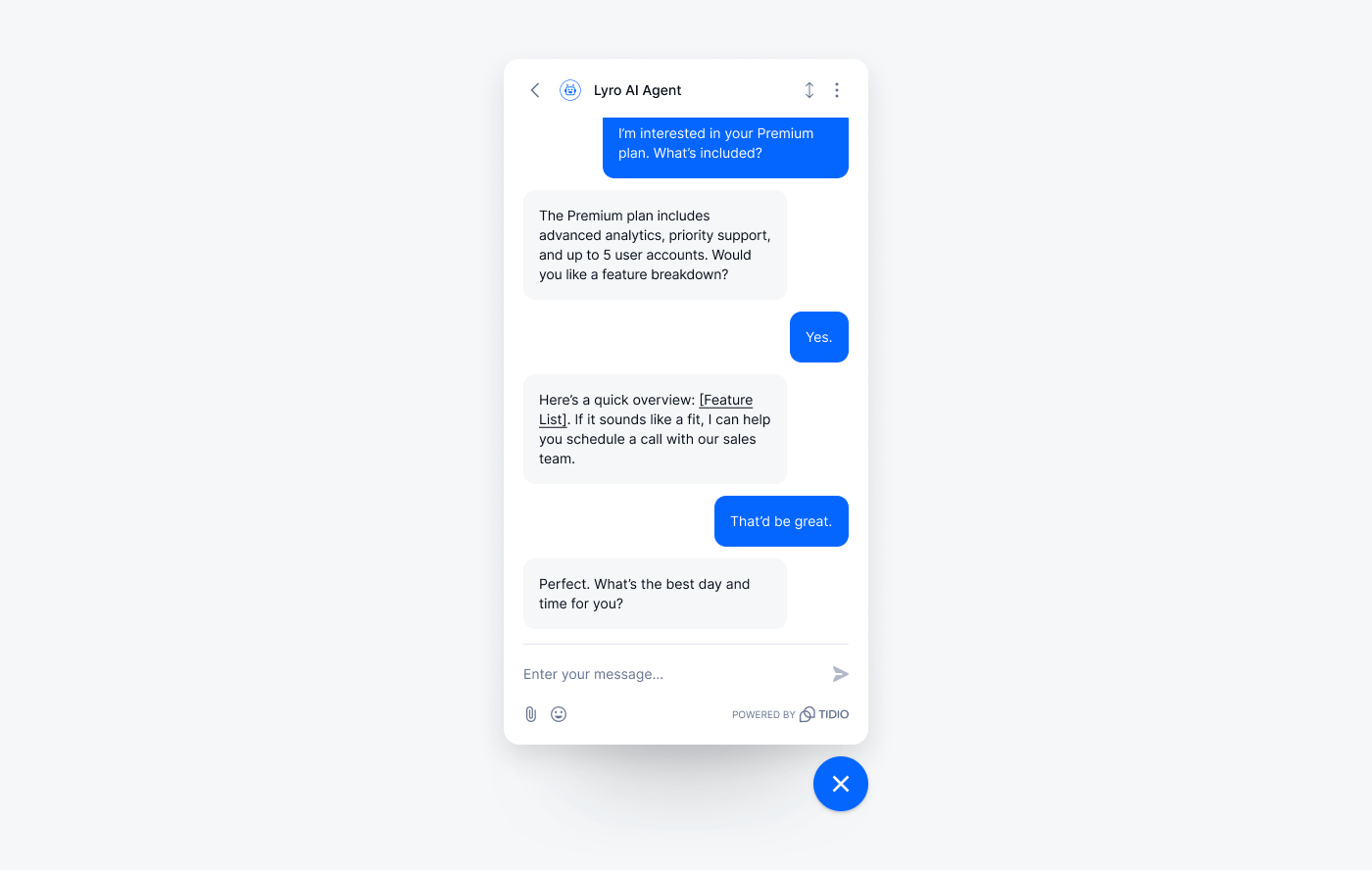
As many as 81% of marketers using AI said it helped drive brand visibility and direct revenue. [14]
One reason: AI powers hyper-targeted personalization.
It identifies buying patterns, segments users automatically, and delivers the right message at the right time. This improves conversion rates and lifts revenue without increasing ad spend.
Additional stats that you may find interesting:
- 93% of marketers use AI to generate content faster, 81% use it to uncover insights, and 90% use it for quicker decision-making
- 75% of marketers in the US say that AI saves organizations’ costs
- 74% of marketers in the US admit that AI helps them enjoy their jobs more and exceed campaign targets
Case in point: Endeksa, a predictive real estate data analytics and insights platform, managed to boost lead generation by 138% after implementing Tidio. The company started using the platform to personalize the visitor experience by sending customized messages based on visitors’ behavior.
Read more: Discover how Endeksa used Tidio to increase revenue by reading the entire case study.
7. Lack of training in gen AI has been reported as a big problem by 70% of marketing pros
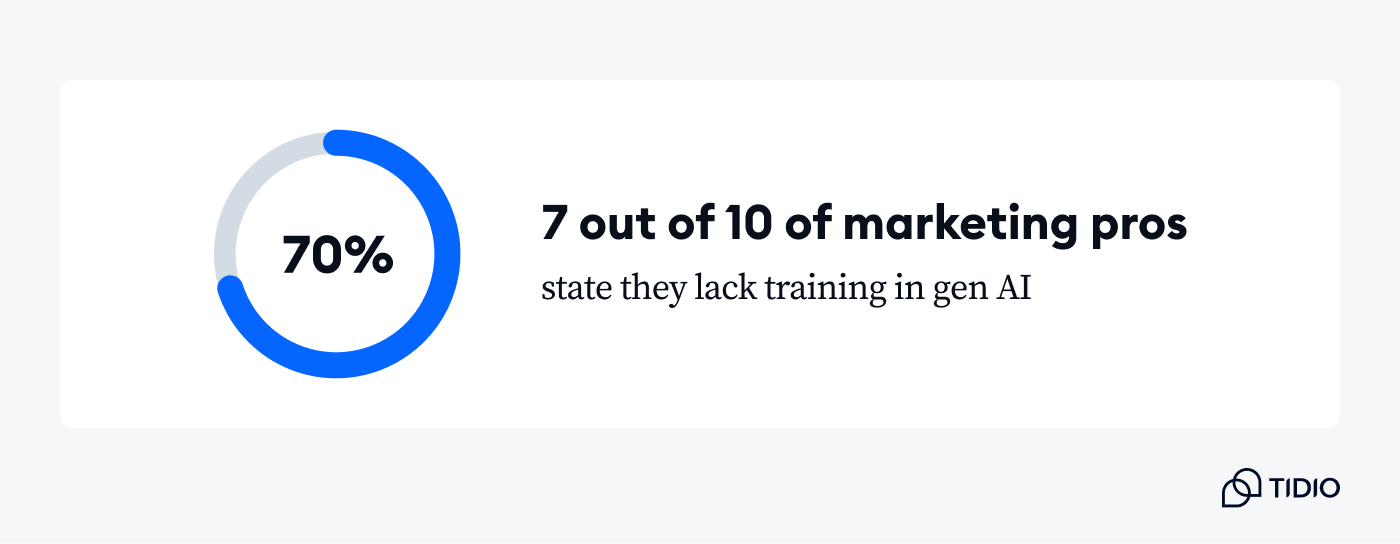
Even as AI becomes essential, most marketers aren’t fully trained on how to use it.
As many as 70% of marketers feel undertrained in generative AI, despite using it in their roles. This training gap is a hidden risk. Without understanding prompt design, data ethics, or bias mitigation, teams might misuse AI or miss out on its full potential. [8]
Companies that invest in internal AI education will outperform others that treat it as a plug-and-play tool.
Additional useful data:
- 39% of marketers don’t know how to use generative AI safely.
- 43% said they don’t know how to get the most value out of it.
- 54% believe generative AI training programs are important for successfully using it in their role.
- Despite that, 7 in 10 marketers said their employer does not yet provide generative AI training.
Read more: Learn best practices for Lyro AI training and how to use this AI agent to automate customer services.
8. 69% of marketing pros feel hopeful about how AI in marketing will impact their roles
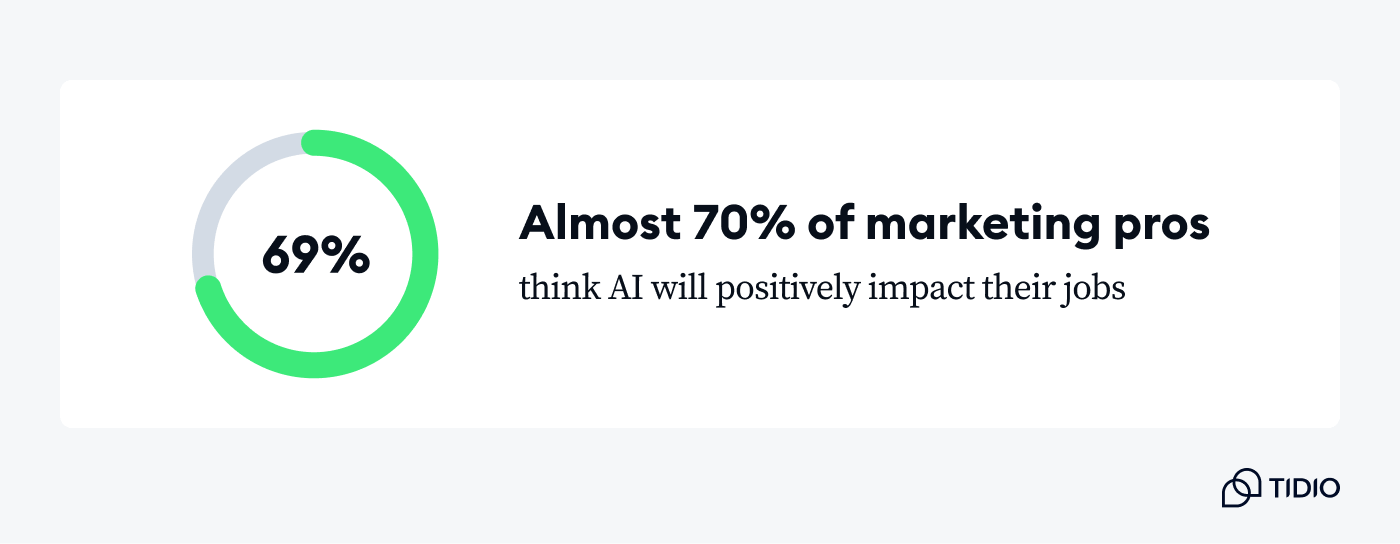
Almost 70% of marketing professionals are optimistic about AI’s role in their future careers. [3]
This optimism is driven by practical wins. AI handles repetitive tasks like reporting and scheduling. That frees up time for strategic work, creative thinking, and innovation.
As tools become more user-friendly, marketers are starting to see AI as something that empowers them, not something that threatens their job security.
9. Almost three-quarters (73%) of marketers agree that AI will improve personalization strategies
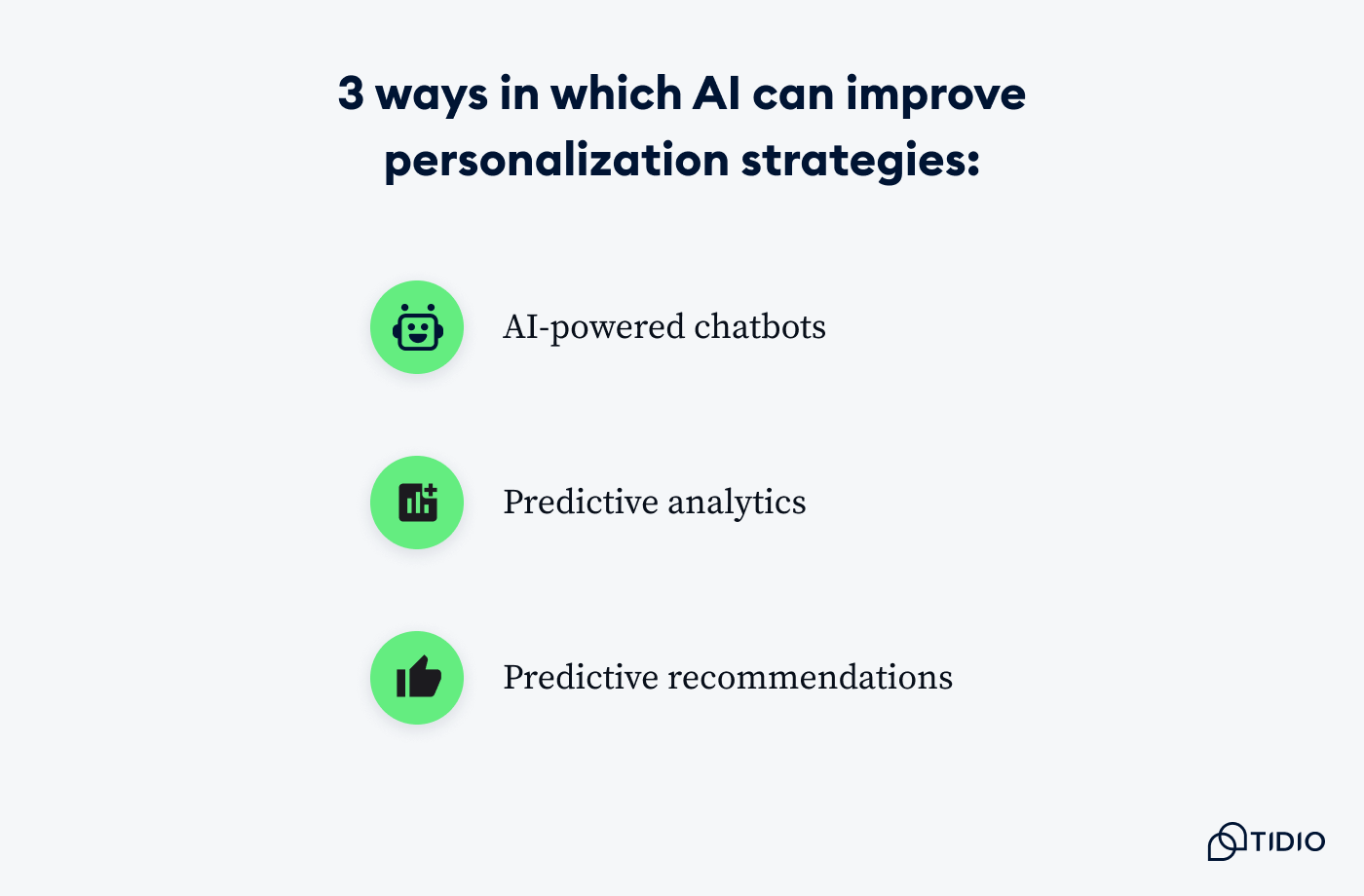
Personalization at scale is one of AI’s strongest advantages.
Over 70% of marketers believe AI will significantly enhance their personalization efforts. [9]
Real-world examples include:
- AI-based customer journeys that adapt in real time.
- Dynamic ad creatives based on user preferences.
- Automated product marketing and recommendations using predictive analytics
Instead of sending the same message to thousands of people, AI helps tailor it to each segment or even each individual. That’s no longer a competitive edge. It’s a minimum requirement in high-performing campaigns (like Christmas marketing or Black Friday campaigns).
10. Over 80% of marketers say AI frees up their time so they can focus on more strategic or creative aspects of their roles
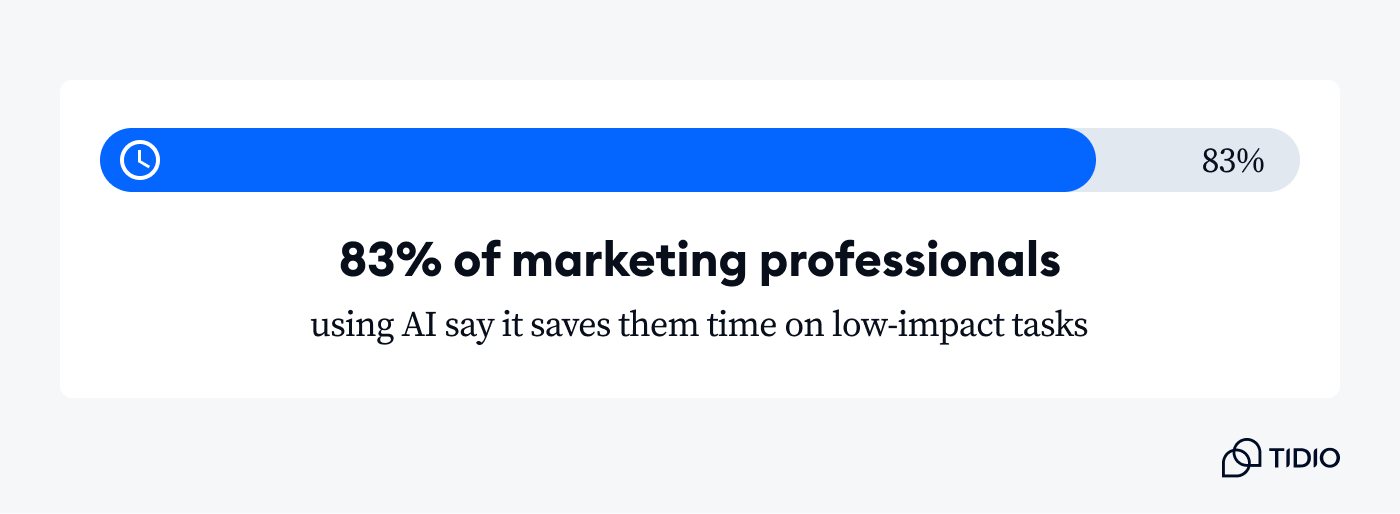
More than 8 out of 10 marketing professionals using AI say it saves them time on low-impact tasks like reporting, drafting, scheduling, and list management. [7]
What they do with that time is where the real value kicks in.
They focus on campaigns, customer insights, brand messaging, and data-driven decisions. These are the areas where human marketers shine and AI simply enables.
In short, AI handles the grunt work. Marketers get to think bigger.
Read more: Learn if AI will take your job and get the paramount AI trends.
What is the future of artificial intelligence in marketing?
The trendlines are clear: artificial intelligence and marketing are only starting their love affair. And the romance is only about to get hotter. Here are a few future-focused statistics that show where we’re headed:
- 78% of CMOs plan to use generative AI to change business models and reveal high adoption of AI tools
- By 2026, 80% of creative roles in marketing will use generative AI daily
- 41% of companies say that the top benefit of responsible AI practices is improved customer experience
- 74% of marketers in the US admit that AI helps them enjoy their jobs more and exceed campaign targets
- 43% of marketers adopting AI admit they don’t know how to maximize its value.
- Younger demographics, particularly those aged 18-29, are more likely to use AI in marketing, both personally and professionally.
AI is quickly becoming a core part of marketing. CMOs are using it to rethink strategy, creative teams rely on it daily, and younger marketers are driving adoption. It’s improving customer experience and helping teams hit their goals. But many still aren’t sure how to get the most out of it.
AI marketing analytics and statistics: key takeaways
The data tells a clear story and hints at several paramount AI marketing insights:
- Most marketers already use AI, but many lack proper training
- AI improves efficiency, personalization, SEO, and campaign performance
- It isn’t replacing marketers. It’s giving them more bandwidth to do better work
- The market is scaling fast. Early adopters are reaping the biggest gains.
Whether you’re running a solo growth team or managing a large marketing department, the message is the same: if you don’t have a real AI strategy, now’s the time to build one.
Because the gap between marketers using AI well and those just dabbling is growing fast.
Sources
[1] Artificial Intelligence in Marketing Market Size, Share and Trends 2024 to 2034
[2] Market value of artificial intelligence (AI) in marketing worldwide from 2020 to 2028
[3] Marketing Trends For A New Era
[4] 28 AI marketing statistics you need to know in 2025
[5] AI in Marketing: The Future of Smart Marketing
[6] New Report Reveals the Top AI Content and SEO Trends
[8] Top Generative AI Statistics for 2025
[9] 40 personalization statistics: The state of personalization in 2025 and beyond
[10] Rebranding the marketing function
[11] Gartner: 20% of brands to go ‘acoustic’ amid rising generative AI concerns
[13] PwC’s 2024 US Responsible AI Survey
[14] Artificial intelligence (AI) use in marketing – statistics & facts

